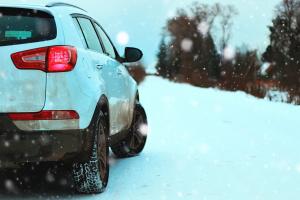Snow and ice weather warning - information and advice
Date published:

Weather warning
A weather warning for snow and ice (external link opens in a new window / tab)has been sent out by the Met Office.
Weather warnings from the Met Office let the public and emergency services know about potentially hazardous conditions.
You can find out more about weather warnings on the Met Office website(external link opens in a new window / tab).
Plan your journey
You should always plan your journey and check the latest weather and travel advice.
Ask yourself if you can delay your journey until conditions improve.
If you do travel, plan your journey carefully and allow extra time.
Emergency numbers
You should note the following numbers in case of emergency:
- emergency services – 999 or 112
- Northern Ireland Electricity Networks – 03457 643 643
- NI Gas Emergency Service – 0800 002 001
- Northern Ireland Water Waterline – 03457 440 088
- Flooding Incident Line – 0300 2000 100
- Housing Executive – 03448 920 901
Report an issue with snow or ice
If you want to report an issue with snow or ice, you can do so online at this link:
Or by phoning 0300 200 7899.
Roads information
However carefully you plan your journey, things can go wrong. An accident or bad weather could mean that a road is closed for a time.
You can get up-to-date traffic and roads information at the following link:
Public transport
You can find the latest information about bus and rail services on the Translink website(external link opens in a new window / tab).
Local council services
If local council services are affected by adverse weather, the latest information should be available on council websites.
Frozen or burst pipes
There is information about how to reduce the risk of frozen pipes, and what to do if a pipe bursts at the following link:
Forests and country parks
You can find updates about forest and country parks on the forest news and events or country parks pages.
Power cuts
If adverse weather causes power cuts, you can get the latest information at this link:
If your power is off and you want to report it or get more information, contact:
- NIE Networks Customer Helpline: 03457 643 643
- Report a power cut(external link opens in a new window / tab)
Flooding advice
If any flooding happens, you can report it by phoning the Flooding Incident Line on 0300 2000 100.
There is general flooding advice on this page:
Contact numbers for agriculture or environment issues
If you have concerns about agricultural issues, animal welfare, water pollution, or rural support you can find contact details on the Department of Agriculture, Environment and Rural Affairs (DAERA) website(external link opens in a new window / tab).
Drive to suit the conditions
During adverse weather, you should:
- clear ice off all windows, lights, number plate, and vehicle roof before you set off
- make sure the mirrors are clear and windows are de-misted thoroughly
- use at least dipped headlights in poor visibility
- keep well back from the road user in front
- be extra cautious at road junctions where road markings may not be visible
- be prepared for the road conditions to change over short distances
Even after roads have been treated in winter, driving conditions may stay challenging, especially if the road location and layout mean there is a high risk of ice.
Be aware that ice forms more easily on:
- hilly or exposed roads
- roads that pass under or over a bridge
- roads shaded by trees or buildings
Try not to brake suddenly in icy conditions - it may lock up the wheels and you could skid.
If you start to skid:
- release the brake pedal fully or ease off the accelerator
- steer into the skid
- as you straighten, steer back along the road
You can find out more about driving in wintry conditions, including fog, at this link:
Check and service your vehicle
You can reduce your chances of breaking down by regularly servicing your car.
You should also:
- top up anti-freeze and screenwash
- check for wear and tear on wiper blades (replace them as soon as they start to smear rather than clean windows)
- make sure your battery is fully charged (replace if it's no longer reliable)
- keep tyre pressure at the manufacturer's recommended level and check you have at least 1.6 mm across the central three-quarters of the breadth of the tread and around the entire circumference
- wipe dirt and spray off headlamps and make sure all bulbs are working
You can find out more on the vehicle maintenance page.
Winter kit
You are advised to carry a winter kit in your vehicle. It should include:
- ice scraper and de-icer
- torch and spare batteries (or a wind-up torch)
- in-car phone charger
- warm clothes and blankets
- high-visibility vest or jacket
- boots
- first aid kit
- jump leads for the car battery
- empty fuel can
- a shovel (if there's a chance of snow)
- road atlas
- sunglasses (the low winter sun and glare off snow can be dazzling)
- two reflective warning triangles
If you're planning a long trip, or if severe weather is forecast, you may want to also have in your car:
- any medication you need to take regularly
- food and a thermos with a hot drink